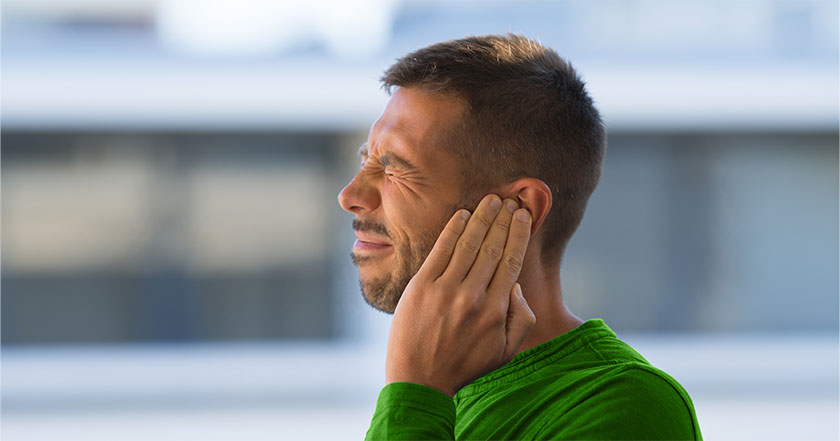
Spring has arrived, and with it comes allergy season. If you have allergies, you’re probably all too familiar with the most common symptoms: coughing, sniffling, watery eyes, etc. But what if your ears start hurting?
Many people don’t realize that allergies can cause ear issues. The threat of an allergy-related ear infection might not even cross your mind until you have uncomfortable ear pain, fluid coming out of your ear, or problems with your hearing.
Earaches and ear infections aren’t just for kids – people of all ages, especially those with allergies, can (and do) experience them. Are you one of them?
Let’s explore this lesser-known symptom of allergies, what to do if you begin feeling pain in one or both ears, and why it’s important to act quickly.
They can. When you’re allergic to a foreign substance (such as pollen, ragweed, or mold) and become exposed to it, your immune system automatically releases a chemical called histamine. Histamine causes your sinuses to create excess mucus to help keep allergen particles from entering your body. When an allergen comes in contact with your sinus tissues, they typically become enlarged or inflamed – leaving that excess mucus with nowhere to go.
Therefore, people with allergies may experience chronic drainage issues and fluid build-up in the middle ear (the air-filled space behind the eardrum that contains the tiny vibrating bones of the ear). Like sinus tissues, the membranes surrounding the eustachian tubes (which connect the middle ear to the back of the throat) can also become inflamed, making it even harder for fluid and air to move through properly.
All that added pressure is what causes your initial ear pain. It’s also the perfect scenario for developing an ear infection.
Yes, especially if ear pain and other symptoms go untreated. Although allergy-related ear infections (also called otitis media) are less common in adults than children, they do still occur.
When fluid remains trapped in your inflamed eustachian tubes, it’s an ideal environment for bacteria to grow. The infected fluid then builds up and becomes pressurized, causing pain, swelling, and redness of and behind the eardrum.
You may already have an ear infection – or be in the process of developing one – if you experience any of the following in combination with your usual allergy symptoms:
In severe cases, your eardrum can rupture, and pus will leak from your ear. The key is knowing when to seek treatment, so your ear infection doesn’t have a chance to get that far.
You should never ignore ear pain or the signs of a developing ear infection. If left untreated, ear infections can lead to permanent hearing loss. Children who get ear infections can also lag in developmental milestones like walking and talking.
Visit a vybe urgent care center right away if:
Infants less than three months old who have a fever, or older children with a fever of 102° F or higher, should also have their ears checked. Children who are too young to describe ear pain symptoms will often tug on their ears or be fussier than usual.
All vybe centers have licensed medical professionals with a wide range of healthcare knowledge. A vybe clinician can quickly evaluate and treat your ear pain or ear infection. Mild ear infections sometimes clear up on their own, but more severe ear infections could require antibiotics and additional treatment.
And here’s great news for allergy sufferers: vybe can treat your seasonal allergy symptoms as well. Visit your nearest vybe to learn more.
Prescription and over-the-counter allergy medications can address a variety of allergy symptoms, including ear pain. Examples of over-the-counter antihistamines include:
To reduce the feeling of fullness in your ear, consider taking an antihistamine that includes a decongestant, such as Allegra-D, Claritin-D, or Zyrtec-D. Patients with high blood pressure should avoid decongestant medications as these can further elevate blood pressure. An acceptable alternative would be Cordicidin-hbp allergy and sinus.
Over-the-counter pain medications such as acetaminophen (Tylenol), ibuprofen (Advil), or naproxen (Aleve) may provide ear pain relief. Other home remedies for ear pain include:
If your ear pain doesn’t improve within a few days, visit a vybe right away so we can examine your ears and confirm if you have an infection.
Spring is one of the toughest times of the year for allergy sufferers. When allergies go beyond sneezing and sniffles to reach the deepest crevices of your ears, vybe is here to help. All vybe centers offer a wide range of urgent care services, including treatment for ear pain, allergies, and so much more.
With 10+ urgent care centers throughout Greater Philadelphia, there’s a vybe in your neighborhood. Find a location and walk in or schedule an appointment today!
FIND YOUR VYBE